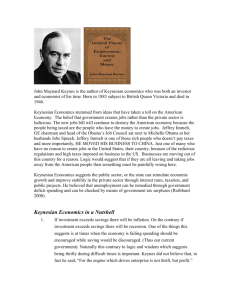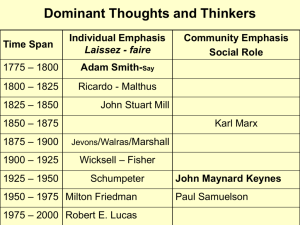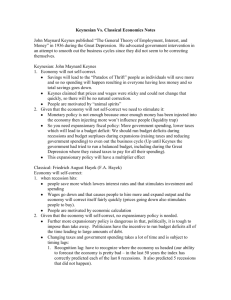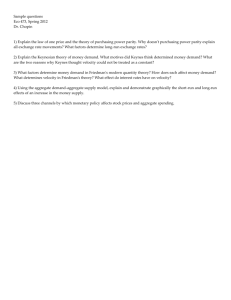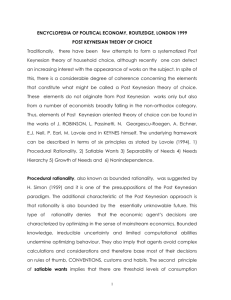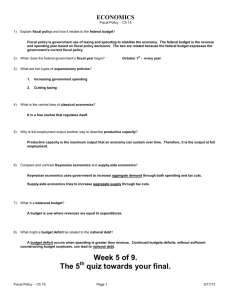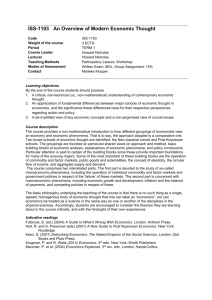Karl Marx and John Keynes - West
advertisement
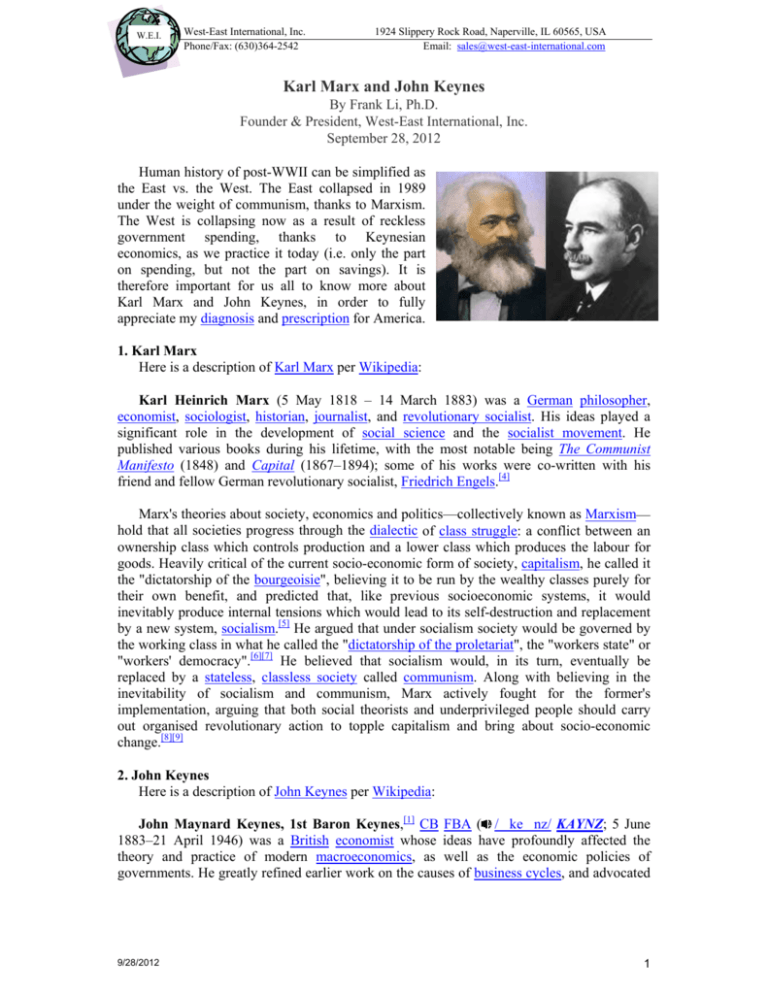
W.E.I. West-East International, Inc. Phone/Fax: (630)364-2542 1924 Slippery Rock Road, Naperville, IL 60565, USA Email: sales@west-east-international.com Karl Marx and John Keynes By Frank Li, Ph.D. Founder & President, West-East International, Inc. September 28, 2012 Human history of post-WWII can be simplified as the East vs. the West. The East collapsed in 1989 under the weight of communism, thanks to Marxism. The West is collapsing now as a result of reckless government spending, thanks to Keynesian economics, as we practice it today (i.e. only the part on spending, but not the part on savings). It is therefore important for us all to know more about Karl Marx and John Keynes, in order to fully appreciate my diagnosis and prescription for America. 1. Karl Marx Here is a description of Karl Marx per Wikipedia: Karl Heinrich Marx (5 May 1818 – 14 March 1883) was a German philosopher, economist, sociologist, historian, journalist, and revolutionary socialist. His ideas played a significant role in the development of social science and the socialist movement. He published various books during his lifetime, with the most notable being The Communist Manifesto (1848) and Capital (1867–1894); some of his works were co-written with his friend and fellow German revolutionary socialist, Friedrich Engels.[4] Marx's theories about society, economics and politics—collectively known as Marxism— hold that all societies progress through the dialectic of class struggle: a conflict between an ownership class which controls production and a lower class which produces the labour for goods. Heavily critical of the current socio-economic form of society, capitalism, he called it the "dictatorship of the bourgeoisie", believing it to be run by the wealthy classes purely for their own benefit, and predicted that, like previous socioeconomic systems, it would inevitably produce internal tensions which would lead to its self-destruction and replacement by a new system, socialism.[5] He argued that under socialism society would be governed by the working class in what he called the "dictatorship of the proletariat", the "workers state" or "workers' democracy".[6][7] He believed that socialism would, in its turn, eventually be replaced by a stateless, classless society called communism. Along with believing in the inevitability of socialism and communism, Marx actively fought for the former's implementation, arguing that both social theorists and underprivileged people should carry out organised revolutionary action to topple capitalism and bring about socio-economic change.[8][9] 2. John Keynes Here is a description of John Keynes per Wikipedia: John Maynard Keynes, 1st Baron Keynes,[1] CB FBA ( / ke nz/ KAYNZ; 5 June 1883–21 April 1946) was a British economist whose ideas have profoundly affected the theory and practice of modern macroeconomics, as well as the economic policies of governments. He greatly refined earlier work on the causes of business cycles, and advocated 9/28/2012 1 W.E.I. West-East International, Inc. Phone/Fax: (630)364-2542 1924 Slippery Rock Road, Naperville, IL 60565, USA Email: sales@west-east-international.com the use of fiscal and monetary measures to mitigate the adverse effects of economic recessions and depressions. Keynes is widely considered to be one of the founders of modern macroeconomics, and to be the most influential economist of the 20th century.[2][3][4][5] His ideas are the basis for the school of thought known as Keynesian economics, as well as its various offshoots. In the 1930s, Keynes spearheaded a revolution in economic thinking, overturning the older ideas of neoclassical economics that held that free markets would, in the short to medium term, automatically provide full employment, as long as workers were flexible in their wage demands. Keynes instead argued that aggregate demand determined the overall level of economic activity, and that inadequate aggregate demand could lead to prolonged periods of high unemployment. Following the outbreak of World War II, Keynes's ideas concerning economic policy were adopted by leading Western economies. During the 1950s and 1960s, the success of Keynesian economics resulted in almost all capitalist governments adopting its policy recommendations. Keynes's influence waned in the 1970s, partly as a result of problems that began to afflict the Anglo-American economies from the start of the decade, and partly because of critiques from Milton Friedman and other economists who were pessimistic about the ability of governments to regulate the business cycle with fiscal policy.[6] However, the advent of the global financial crisis in 2007 caused a resurgence in Keynesian thought. Keynesian economics provided the theoretical underpinning for economic policies undertaken in response to the crisis by Presidents George W. Bush and Barack Obama of the United States, Prime Minister Gordon Brown of the United Kingdom, and other heads of governments.[7] 3. Discussion Both Marx and Keynes were prolific in theory. Neither harmed society directly. It is their disciples, who used, and are still using, their works as the tools to effect changes that have caused severe damage to the world. Two examples: (1) Mao Zedong: It is apparent that Mao believed in nothing, other than himself. But he used Marx’s populist theories fully to his advantage, especially in support of his own theory of revolution and his brutal ruling of China (1949–1976). Mao also used Lenin and Stalin, only to turn on Stalin when Mao became “tired” of him, both ideologically and personally. (2) Franklin D. Roosevelt: FDR faced formidable challenges (e.g. The Great Depression) when he was elected to the American Presidency. He did everything possible to remain popular, including raiding the public treasury and introducing Social Security, thus ensuring his repeated re-elections (yes, three times)! Consequently, America was fundamentally changed from a society based on rugged individualism and unfettered capitalism to an entitlement society. It has only been progressively getting worse since then, with the government getting so big and fat now that its massive weight is crushing America. A key theory behind America’s big government [spending] is Keynesian economics, which, together with the outdated American political system, has been severely damaging America’s economy! 9/28/2012 2 W.E.I. West-East International, Inc. Phone/Fax: (630)364-2542 1924 Slippery Rock Road, Naperville, IL 60565, USA Email: sales@west-east-international.com Worse yet for America, despite the fact that both Presidents Hoover and FDR admitted that it was WWII, not the massive government spending, that finally got America out of the Great Depression, many left-wing extremists (e.g. Paul Krugman and Robert Reich) still try to keep this biggest lie of the 20th century going by actively advocating deficit spending as the only way out of today’s Great Recession. These folks have made their livings out of Keynesian economics. They blindly, irresponsibly, and shamelessly promote it, just like communists promoted Marxism a few decades ago, even in the face of mounting evidence that what they sell does not work, nor has it ever worked actually. Now, the real truth about WWII and America … Here is an excerpt (slightly updated in wording) from a previous post of mine (Pyramid Theory II): It was WWII that finally got America out of the Great Depression, although Keynesians like to credit the massive government spending, which was the biggest lie of the 20th century. In other words, America did win WWII. But more significantly, America’s competitors either destroyed themselves through the war (e.g. Germany and Japan) or screwed themselves up badly by adopting a bad system called “communism” after the war (e.g. China and the Soviet Union). As a result, America was left as the only game in town, making and inventing virtually everything and naming its own prices. This not only got America out of the Great Depression finally, but also created prosperity in America for the ensuing five decades. In other words, from 1946 to 1999, America was the economic monopoly in the world: America simply could not screw up enough, because America could afford anything and everything. Three examples: (1) JFK: Public-sector unions? No problem! (2) Jimmy Carter and Bill Clinton: The CRA (Community Reinvestment Act)? No problem! (3) The neo-cons: Out-Of-Control Spending on Military? No problem! Why are they big problems now? BRICS showed up - America is no longer the economic monopoly! Not only can we no longer afford the same screw-ups as before, but also it’s payback time for the past screw-ups! What about a new screw-up like Obamacare? It's suicidal! If you, as a Keynesian, insist on an analogy between the Great Depression and the Great Recession as the problem, do your solution with the analogy between WWII and WWIII (America: 10 Big Questions and 10 Honest Answers), not massive government spending! Other than that, no solution from the past is applicable today! Why? Because the world today is very different from the past! America needs a new solution, which must begin with an accurate diagnosis! Oh, Paul Krugman appears to possess great credibility after winning a Nobel Prize. Mikhail Gorbachev also won a Nobel Prize! But I called Gorbachev “brainless and reckless” for the way he dismantled the Soviet Union (Kleptocracy: A Fourth Similarity between Communism and Democracy). I have the same regard for Paul Krugman for the way he has been damaging America’s economy, through relentless promotion of Keynesian economics! 9/28/2012 3 W.E.I. West-East International, Inc. Phone/Fax: (630)364-2542 1924 Slippery Rock Road, Naperville, IL 60565, USA Email: sales@west-east-international.com 4. Keynesian economics and entitlements Once again, Keynesian economics is the driving theory behind the various entitlement programs in America, which started big time with the introduction of SS (Social Security). What, then, is SS, anyway? (1) SS is an entitlement program for those recipients who have not paid into it. (2) SS is not an entitlement program for those recipients who have paid into it. To those people, SS is like an insurance program: some get more out of it, while others less. SS was a Ponzi scheme from its first day, and remains so today. It is therefore destined to fail. Worse yet, with the additional costs of ADC (Aid to Dependent Children), SSI (Supplemental Security Income), and free benefits for immigrants who have never contributed, SS funding is increasingly falling short, making its failure faster! In short, SS, as we know it today, will fail - the longer we keep resisting reforms, the harder it will fail us later! Medicare is like SS in every way! Medicaid is a total entitlement program from A to Z! Feel free to go on and on, by yourself … 5. Closing Marxism is very bad. Keynesian economics, as we practice it today (i.e. only the part on spending, but not the part on savings) is also very bad! Both rely on the false premise of “something for nothing”, which simply can’t exist in the real world. We must recognize this and keep a watchful eye on the leaders espousing Marxism or Keynesian economics! In conclusion, watch this animated movie: Reagan vs. Obama: Social Economics 101. 9/28/2012 4
